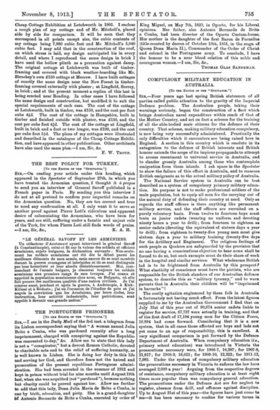THE PORTUGUESE PRISONERS.
[To THE EDITOR OF THE "SPECTATOR.'] see in the Daily Mail of the 3rd inst. a telegram from its Lisbon correspondent saying that "A woman named Julia Brito e Cunha, who was pardoned recently after a long imprisonment, charged with conspiring against the Republic, was rearrested to-day," &c. Allow me to state that this lady is not a "conspirator," but a devout Roman Catholic, devoted to charitable acts and to the relief of suffering humanity, as is well known in Lisbon. She is doing her duty in this life and serving her God, and therefore fears not the hatred and persecution of the present republican Portuguese administration. She had been arrested in the summer of 1912 and kept in prison without trial for nine months until August 19th last, when she was acquitted (not "pardoned "), because nothing but charity could be proved against her. Allow me further to add that this lady, Dona Julia Maria de Brito e Cunha, is one by birth, education, and piety. She is a grand-daughter of Antonio Bernardo de Brito e Cunha, executed by order of King Miguel, on May 7th, 1829, in Oporto, for his Liberal opinions. Her father, also Antonio Bernardo de Brito e Cunha, had been director of the Oporto Custom-house. Her mother is the daughter of the first Baron de Fornellos (title created by decree of October 13th, 1851, in the reign of Queen Dona Maria II.), Commander of the Order of Christ and colonel in the Portuguese army. To conclude, I have the honour to be a near blood relation of this noble and courageous woman.—I am, Sir, &c.,
THOMAS GLAS SANDEMAN.


















































 Previous page
Previous page